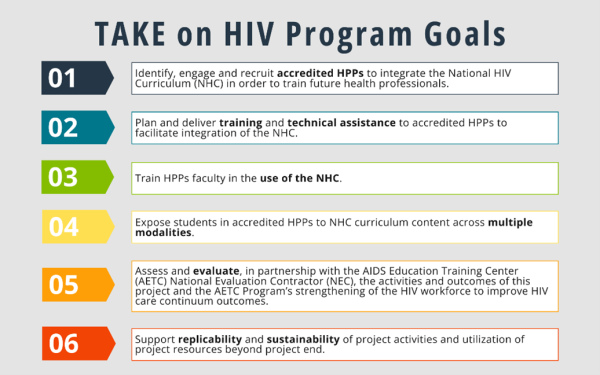Background
The epicenter of the HIV epidemic is the Southern U.S., where 52% of all new U.S. HIV diagnoses occur and where 38% of the U.S. population lives. Nearly half of all deaths from HIV occur in the South (1). While bearing a heavy burden of HIV diagnoses and deaths, the Southern US lags behind in HIV education, prevention, and treatment services.
An adequate HIV workforce is essential to end the HIV epidemic. Current workforce capacity is stretched thin and inadequate to provide high-quality HIV care in areas of the country with the highest burden of both new diagnoses and people with HIV (2).
In order to increase the HIV provider workforce, health professions program (HPP) trainees and graduates must have multiple opportunities to gain expertise in HIV care. Workforce expansion is an essential pillar for achieving the goal of successfully ending the HIV epidemic
The HIV provider workforce in the U.S. is in decline. The gap between available HIV providers and people with HIV who need their care continues to grow. This need is particularly pronounced across the southern U.S., where the majority of those with HIV live, including those in rural communities that face persistent barriers to equitable health care.
Dr. Waridibo Allison, Program Director/Principal Investigator of the TAKE on HIV project
What is TAKE on HIV?
Targeted Access Knowledge and Education on HIV for Health Professions Programs (TAKE on HIV), a project funded by the Health Resources & Services Administration’s HIV/AIDS Bureau (HRSA HAB), provides tailored training and technical assistance to support the integration of the National HIV Curriculum (NHC) into accredited HPPs across the country, with a focus on the Southern U.S.

Why is TAKE on HIV necessary?
TAKE on HIV helps to address the national shortages in the HIV health care workforce by supporting the pipeline of future health care professionals who are trained in delivering evidence-based treatment and care to people with HIV.
TAKE on HIV Resources:
- Access the National HIV Curriculum
- The NHC, developed by the University of Washington, is a HRSA HAB AIDS Education Training Center (AETC) Program resource. The curriculum provides ongoing, up-to-date information to meet core competency knowledge for HIV prevention, screening, diagnosis, and ongoing treatment and care to healthcare workers in the U.S.
- Join an Individual Learning Group (ILG)
- The Individual Learner Group is a virtual community of practice and learning that offers self-directed study of the National HIV Curriculum and access to additional HIV telementoring resources.
- Supports health professions students in programs that haven’t formally integrated the NHC and who want to complete the NHC as individual learners.
- Utilize the HIV/HCV Education and Learning for Providers (HELP) Mobile App
- The HELP mobile app includes guidelines for reporting coinfection, pretreatment diagnostic requirements, treatment decision trees, drug access protocols, and resources for continuing education.
- Attend our Hepatitis & HIV/Hepatitis Coinfection ECHO
- This free monthly telementoring series focuses on mentoring healthcare workers on diagnosing, managing, treating, and caring for people with viral hepatitis and hepatitis/HIV coinfection. Note: this ECHO series has a two-step registration process, first with SC AETC, then with Zoom for attendance.
Vision
TAKE on HIV’s vision is to create a collaborative effort that enhances the quality of HIV education and training at health professions programs across the US, paving the way for future health care professionals who are adequately trained to medically manage and care for people with HIV.
To end the HIV epidemic in the U.S., it is imperative that there is an adequate workforce with sufficient HIV knowledge and expertise to facilitate HIV prevention, screening, diagnosis, and treatment. We are grateful to have this funded opportunity to bolster HIV knowledge within the health professions workforce pipeline. It is an opportunity we will not waste.
Dr. Waridibo Allison
References:
1. Centers for Disease Control and Prevention. Issue Brief. HIV in the Southern United States. Accessed 20th January 2022. Available from: https://www.cdc.gov/hiv/pdf/policies/cdc-hiv-in-the-south-issue-brief.pdf
2. Armstrong WS. The Human Immunodeficiency Virus Workforce in Crisis: An Urgent Need to Build the Foundation Required to End the Epidemic. Clin Infect Dis. 2021;72(9):1627-30.
